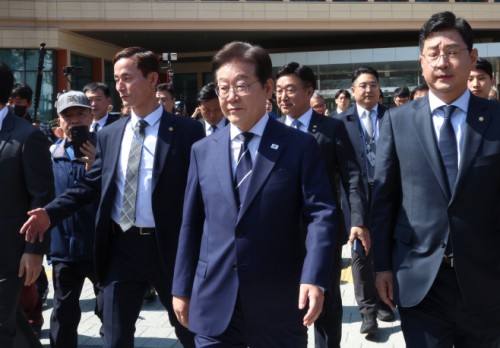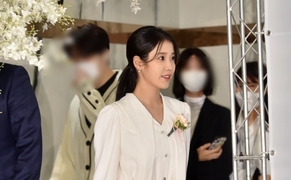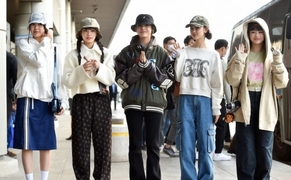 |
| Lee Jae-myung, former leader of the Democratic Party of Korea and declared candidate for the 21st presidential election, leaves the National Assembly’s press center after announcing his campaign vision and key appointments on April 11. / Photo by Song Ui-joo |
Lee Jae-myung, presidential hopeful for the Democratic Party of Korea, pledged on April 14 to transform South Korea into one of the world’s top three artificial intelligence powers, calling AI “a game-changer that will redefine the global economy.”
In a statement posted on Facebook, Lee said, “Korea must no longer be a catching-up nation. We must become a leading country that shapes the future of the world with cutting-edge science and technology. ‘K-AI’ is essential to the ‘K-Initiative’ vision.”
He proposed a bold investment strategy, promising to “usher in an era of 100 trillion won ($73 billion) in AI investment.” Lee emphasized that the government should act as a catalyst for private-sector investment by dramatically increasing the national AI budget to exceed levels seen in advanced countries.
Lee also vowed to overhaul the largely inactive Presidential Committee on National AI by turning it into a key decision-making body. “The president will chair the committee, which will be restructured into a central platform where engineers, researchers, private companies, and the government work together,” he said.
Plans also include establishing a national AI data cluster to create the infrastructure for a global AI hub. Lee pledged to secure at least 50,000 GPUs — a critical resource for AI development — and to support the development and testing of AI-specific NPUs to ensure technological sovereignty. He also vowed to open up more public data to private developers for research and innovation.
On the international front, Lee proposed the creation of a global AI co-investment fund and joint development of shared technologies with partner nations. “Expanding cooperation to the Pacific, India, and the Middle East could increase the digital population to over 1 billion,” he said. “That would lay the groundwork for Korea to lead the K-AI initiative on a global scale.”
Lee stressed the importance of nurturing AI talent, saying, “Success in AI ultimately depends on the people who design and train it.” He emphasized the need to correct the shortcomings of previous quantity-focused approaches by fostering innovative, open-minded problem solvers.
He proposed establishing AI colleges at regional universities and expanding graduate programs to train more professionals. To support this, he called for expanding military service exemptions for top-tier AI researchers and actively attracting foreign talent. He also promised support for cultivating AI experts across industries, including manufacturing, ICT, beauty, and defense.
Finally, Lee called for rationalizing AI-related regulations. “We must examine whether companies have been held back by premature or excessive regulations,” he said. “We will streamline AI-related laws to ensure companies can focus entirely on innovation without undue interference.” He also pledged to revise legislation related to the AI industry ecosystem and expand regulatory exemptions in designated AI innovation zones.
Most Read
-
1
-
2
-
3
-
4
-
5
-
6
-
7





















